My cousin Allan Lemley passed away on May 21, 2025, at 9:30 pm. He was surrounded by friends and family at the home where he and Amanda raised three wonderful girls in Portland, Oregon. He was 69 years old.
I live far away in Tempe, Arizona and could not be there. But the news devastated me.
Allan and I were both born in 1955. My only sibling is my older sister Nancy, so when we were kids, he was the brother I never had. And though I lived all over the US in the course of my career as a journalist, he and I kept in touch, often talking on the phone for hours.
I wanted to take some time to recall my life with him, so that those who loved him – and there are many – might know a little more about this amazing man.
He was also a lifelong lover of history, so it seemed appropriate to write a short history of Allan Lemley.
A Son of Sherman County
Lemleys have raised wheat and cattle in Sherman County, Oregon, for over a century, since our great-grandfather Charles Lemley moved there from Eastern Washington in the early 1920s.
Allan grew up on the family’s 2,000-acre wheat and cattle ranch about 15 miles southwest of the town of Grass Valley, population 167.
It is lonely county. The nearest neighbor to the Lemley ranch house is two miles away.
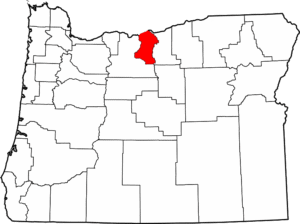
Sherman County, small but mighty
Childhood in Sherman County was always different from childhood in the city. For example, my father Duane Lemley, born in 1927 and raised in Grass Valley, told me he rode a horse to school, and his dad gave him a revolver to shoot rattlesnakes along he way.
Duane was eight years old at the time.

In 1932, here are Helene and Arzell with their children from left: Duane (my father) Gordon (Allan’s father) and Eileen (whose sons Mike and Dan you’ll see in photos below). Dog’s name unknown, but possibly Rowdy. The fourth child, Carolyn, wasn’t born yet.
Duane’s older brother was Gordon Lemley, Allan’s father. The brothers followed quite different career paths. Gordon took over the family wheat and cattle ranch from their father, Arzell, who was Charles Lemley’s son.
My father became a social worker in Portland.
But my cousin Allan and I became close as kids despite living 130 miles apart because my family made the two-hour drive to the ranch many, many times. My father, though a white-collar guy, was essentially a farm kid, so he went out to help with the wheat harvest each year.
This meant I spent many long summer days living at the ranch with Allan, principally in the mid-1960s and early 70s, when we were between 10 and 15 years old.
Every Boy’s Dream
I liked suburban Portland, but summers at the ranch were absolutely heaven.

Allan, age 6 in 1961, ready to round up some cattle rustlers.
One of the most remarkable aspects of being 12-year-old boys on that ranch is that Allan and I were expected to work. This involved feeding Allan’s hogs and doing various other chores, but much more fun, we actually drove the wheat truck during harvest.
There was, and is, no law against a child driving a vehicle on private land, so at age 12, Allan and I would get into the big blue wheat truck and try to get right next to the combine so it could unload its collection of wheat grains freshly swept from the stalks.
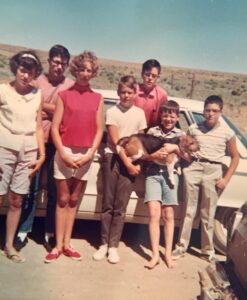
The cousins gathered at the ranch in the mid-60s, from left: Allan’s siblings Jan and Ken, my sister Nancy, me, Mike Moore, Allan, Dan Moore and Peppi the Wonder Beagle
So the truck driver had to carefully note the combine’s position to avoid losing any grain.
Allan and I knew nothing about driving a truck and in that age before helicopter parenting, it didn’t occur to anyone to teach us. So, while driving along, we would have spirited discussions about important matters like which pedal was the clutch and which was the brake, and how to find second gear. Alan, shorter than me, could barely see over the dashboard.

We boys had to place the truck correctly. Spilling wheat was frowned upon. I think we occasionally managed to get at least some in the truck.
As far as I know, nobody got run over as a result of our driving effort, but that was sheer luck.
Hard work was part of life for kids there. Periodically, they had to “pull rye.” When wild rye grew among the wheat stalks, the rye grains would get mixed in with the harvested wheat, lowering the quality and price.
So, by hand, the kids would walk through the fields and pull the rye stalks out. It was a labor of Hercules, or maybe Sisyphus – essentially, pulling all the weeds of a 2,000 acre vegetable garden by hand.
Full disclosure – I never had to do this, but Allan filled me in on its attendant agonies.
Young and Wild
When harvest was over, it would boggle the modern mind to learn how little supervision a couple of 12-year-old boys got in Sherman county in 1967. We were basically feral, sort of like the family dogs, out of sight of any adult for entire days. Now and then our cousins Mike and Dan Moore, sons of Gordon and Duane’s sister Eileen, would join in, though they lived further away and could not visit as often.

Cousins Mike Moore, me, Dan and Allan and Grandpa’s in Grass Valley, 1965

I am not sure if young boys play-fight anymore, but back then, it was more or less constant.
Some memories:
@ Allan and I throwing darts at each other in the front yard. These were real dartboard darts. In retrospect, this seems stupid and dangerous, but no more stupid and dangerous than most of what we did.
@ Playing 45 rpm records that belonged to Allan’s siblings Ken and Jan, especially “One Eyed, One Horned Flying Purple People Eater” (Check it on YouTube)
@ Roughhousing with Allan’s pet raccoon named Coony. They also had a cat named Lawnmower, and Peppi, a fat nearsighted beagle who liked to ride in the truck, but would always duck when we drove under an overpass because he thought it would hit his head.
@ Playing with Allan’s many GI Joe figurines. All of them were riddled with .22 caliber bullet holes as Allan used them for target practice, something my suburban friends never did.
@ Jumping out of the loft into piles of hay. We probably should have checked the pile for pitchforks first, but never bothered.
@ Eating anything we could find. Allan loved a cereal called Sugar Pops, on which he put several tablespoons of sugar.
@ Riding a 70 cc Yamaha motorcycle. In the world of motorcycles, this was a tiny one with very little power, but we compensated by going to the top of the hill near the ranch and going flat-out downhill, which would get us to about 40 mph. On one occasion, as we were zooming along, Allan reached down and turn off the ignition key. The engine immediately seized, both of us went flying and skidding down the gravel road in T-shirts and shorts. Then we limped home more or less covered in blood, which made our mothers shriek and struck us both as quite funny. (Me: “Why did you shut off the key?” Allan: “I dunno, just wanted to see what would happen.”)
@ Playing Dealer’s Gravy with the whole family, This is a wonderful card game for anyone from 8 years old to 80, and we covered that age span in our family games, This is a tradition that really needs to come back.
@ Going the movie theater in Moro to watch Elvis in “Viva Las Vegas.” The theater was about the size of an average living room, and packed to the gills with maybe 40 people. (Side note: Allan and I thought our older siblings, especially Ken, were incredibly hip and happening, and we liked Elvis and the Beatles because he did, too. Allan and I also planned many ambushes to see if, combined, we could beat Ken up, but he lifted weights in those days so we always decided not to proceed.)
@ While Gordon and Duane drove the pickup over the snow, Allan and I riding a sled that they tied with a rope to the hitch in back. Pretty sure they never looked back. It was our job to hold on.
@ Digging the whole western vibe. Allan’s dad Gordon always wore a cowboy hat and cowboy boots (the latter provided ankle support for a leg withered by polio as a teen). Gordon and Mary’s farmhouse featured a lamp shaped like a covered wagon, a brace of rifles in a racks in the hall in in the pickup truck, and crazy old-west stuff in the basement including a hand-cranked phone.
@ They also had a “party line” which meant many neighbors used the same phone line. You were supposed to answer only if your heard your distinctive ring-pattern, but most suspected nosy neighbors picked up on every ring to listen in. So you only said nice things about your neighbors when talking on the phone.
@ Listening to the coyotes howl as I drifted to sleep in Allan’s room. I was definitely not in the suburbs anymore.
Life Off the Ranch
Allan and his family also came often to our house in Portland. He loved city life, I loved the country, we we enjoyed showing off our respective homes to each other.
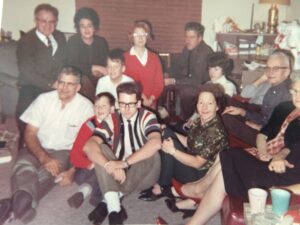
Christmas (I think) with the family at our home on 168th St. in Portland, mid-60s. Back row from left are Henry and Dorothy Tetz (Dorothy was Helene’s sister), my sister Nancy and Uncle Gordon. The rest from left: Duane, Allan, me, Ken, Allan’s mother Mary, Gordon and Duane’s sister Carolyn, invisible obscured person, Frank (Arzell’s brother) and Katherine, Arzell’s mother.
We also loved rampaging around the abandoned church next door to Arzell and Helene’s house in Grass Valley. The extended family spent many Christmases there, laughing and stuffing ourselves with Helene’s fabulous meals.
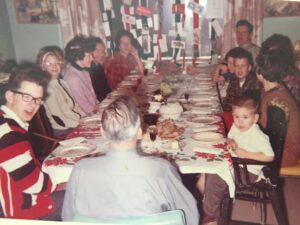
The extended family at Grandpa’s house for Christmas, mid-60s. I’m in the middle of the table on the right, Allan is to my right. At every meal, he was to my right, and since he was left-handed, I had to contend constant prods from his elbow as he ate.
Teens Years and Beyond – Student, Father, Producer
It was a major blow to the family, and especially Allan, when his beloved mother Mary died in 1972 at age 45. As her youngest and the only one still at home, he suffered terribly as did his father Gordon (I remember Gordon staring straight ahead and saying quietly, “It’s the end of the world, that’s all.”)
It was perhaps the saddest funeral I ever attended – everyone loved Mary.

Allan’s Mom Mary. Her death from symptoms of lupus was a huge blow to Allan many others. She was also my mother’s dearest friend.
In later years, Allan and I did not spend so much time together as I went to Washington DC to work for National Public Radio and the Washington Post, while Allan stayed in his beloved Portland to attend Portland state and get a marketing degree.

The hippy years, possibly 1975. My mother Darleane in the foreground.
I remember him telling me of a revelation during his education. “Everything is marketing!”
He went on to become a successful producer and filmmaker. He married and had triplet girls, Claire, Katie and Mary, whom he loved fiercely.
But we spoke often on the phone, typically for hours. As an adult, Allan became incredibly well read and astute about history, and loved to tell me about the sensational, sinister, and heroic history of Portland’s founders.
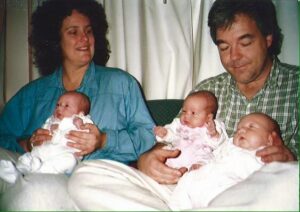
Amanda, Allan and their baby triplets. From left: one of them, and another one, and another one.

A few years later. From left, Claire, Allan, Amanda, Mary and Katie.
He was also a gifted guitarist, I am not typically a guy who seeks out live music, but there was something truly special about his work with The Reverb Brothers, I read a review once that said it was “the ultimate in music therapy” and I think that is true, it simply made you a happier person to hear a Reverb Brothers set.
A highlight of my life through the years was returning to the ranch for the family reunions that we called the “Oyster Feed,” when Allan, Claes Almroth and the Reverb boys would play into the night for assorted family and friends.
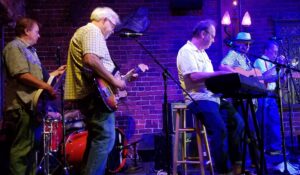
Reverb Brothers reverberating in Portland
(I always loved the organizing pricinple of those Oyster Feeds. You were welcome to come if you were a Lemley, were married to a Lemley, knew a Lemley, had ever met a Lemley, or had on at least one occasion seen a Lemley. In other words, the Lemleys were friendly people, and the vibe was always amazing.)
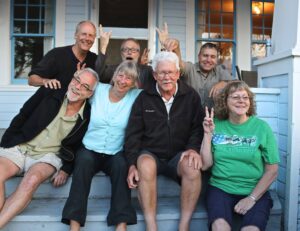
Gathered at an Oyster Feed on Sept. 7, 2015. We are spread out all over the country, so this was a rather rare meeting of the cousins. Everyone here is a grandchild of Arzell and Helene Lemley. Back row from left: me, Dan Moore, David Stump Jr. Front row from left: Allan, Nancy Soreng, Ken and Jan.
At one of these family get-togethers, Allan got bitten by a small rattlesnake as we sat in the front yard talking. Typically, he didn’t make a big deal out of it – keeping his hand in his pocket so no one would notice the swelling. When his wife Amanda, a nurse, demanded to see it, she rushed him to the ER. That experience gave me a taste of Sherman County life, as the locals at the party thought taking him to the hospital was overkill. “Just give him a little Benadryl” they said.
Sherman County people are built different.
Allan was one of them. Out there in that dry, rough land, nothing comes easy, and people get by principally by working hard, helping their neighbors and seeing the humor in everything.
Allan was kind, he was funny, he had a wonderful laugh, and a wit as dry and formidable as Sherar’s Grade in July. I remember him telling me once that his sister Jan was the most socially adept person he had ever known. “She knows everybody’s name, everybody’s birthday, everybody’s cat’s name and probably everybody’s cat’s birthday.”
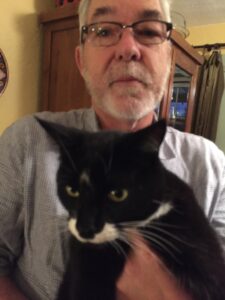
Allan and cat, both unimpressed. Both are sure you could do better if you put your mind to it.
Missing Allan
In our last conversation just a couple of weeks before he died, Allan, typically, spent little time talking about himself. He said he had kidney cancer but mentioned it almost casually, and said he was treating it with immune therapy. He asked about my son Alex, a game developer in California, and shared his delight in holding his first grandchild, James, from daughter Katie.
He did not seem worried. Allan really never seemed worried. From his Dad Gordon, he has clearly inherited a temperament that was quicker to find humor than threat in any situation. Ever the history lover, we spent most of the call talking about Allan’s love for the ancient cities of Spain he visited while his daughter Mary lived there. He knew everything about these ancient towns, it seems, and dreamed of going back to them.
Two weeks after we spoke, he died.
I’m not sure it will ever seem real to me that he is gone. Allan to me will always be my country brother, a guy with endless love, wit and affection for his family, friends and the world. Those sunbaked days are burned, happily and forever, in my memory even now at age 70, and they will remain among my most precious memories for as long as I live.
Godspeed Allan, I love you.